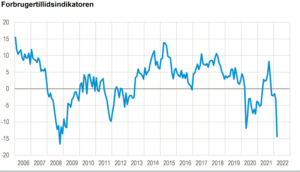News
Ukraine impact: Consumer confidence at lowest point in years
This article is more than 3 years old.
The public clearly believes that the economy will be in worse condition in the near future, according to report

The conflict in Ukraine has had quite the impact (photo: Danmarks Statistik)
Just a few weeks ago consumer confidence was sitting pretty.
The Danish economy has been among the best in the world to weather the Corona Crisis – even managing to come out on the other side in better shape than before the pandemic started.
But the public’s optimism of future finances has been in freefall since Russia invaded Ukraine in late February.
The latest consumer confidence index figure from Danmarks Statistik showed levels were at minus 14.4 for March – the lowest it’s been since October 2008 when it was at -16.6.
READ ALSO: War in Ukraine to impact Denmark’s economy
Clouds on the financial horizon?
According to Danmarks Statistik, the sharp decline is due to significant drops in four of the five indicators that make up the overall consumer confidence level.
And in particular, consumer expectations for Denmark’s economy in a year’s time have waned considerably.
Consumers expect their family financial situation to be substantially poorer a year from now – reflected by the indicators that show that it went from 0.5 last month to -26.0 today.
Consumers also expect that it’s not beneficial to obtain larger consumer goods at the moment and unemployment will have risen this time next year.










































